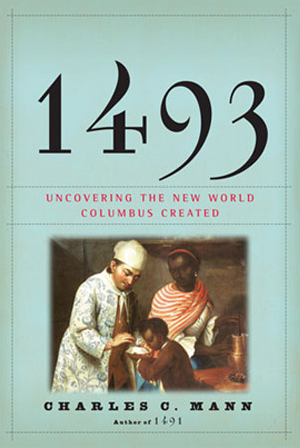I did not enjoy reading
1493. I fully expected that I would, given my recent foray into environmental history, but it turns out that the very act of gaining knowledge in advance sapped the joy from the reading. Mann, it seemed, had little to offer me that I hadn't already seen argued with more force and clarity elsewhere. In fact, I found the reading so dreary, so basic and redundant, that I had entirely discarded my original intention to review it here. This past week, however, the book came up in a discussion of those who were either new to the field of environmental history or who were outside the field of history altogether. Their unabashed enthusiasm about the work led me to reconsider Mann’s purpose and thus to reevaluate the book’s value.
Charles Mann hardly needs my recommendation. His earlier book,
1491, was a bestseller. That work explored the Americas prior to the arrival of Columbus. This latest work,
1493: Uncovering the New World Columbus Created, is sometimes, though inadequately, cast as a sequel. In fact, what Mann sets out to do is to update and make accessible the pioneering work of Alfred Crosby first expressed in books like The Colombian Exchange and Ecological Imperialism. The basic premise is that in inaugurating the modern age of truly global intercourse Columbus did not discover a new world so much as create one. The rapid, primarily unintentional, transport of organisms big and small, the change in the way the land was used, and massive demographic shifts made the world of today what it is, making
1493 the beginning of our present age.
This conceptualization of the world is, unsurprisingly, necessarily flawed. Global intercourse no more started with Columbus than electricity started with Thomas Edison. The first voyage of Columbus makes for a convenient watershed moment, and Columbus himself is an important if exaggerated figure. Nevertheless, a view of history in grand, sweeping moments of dramatic change pervades the book, even as it is at odds with the way professional historians generally conceive of historical change.
Beyond this, however, Mann does a phenomenal job both of engaging serious scholarship in environmental history and, in spite of not being under the strictures of academic ethics, citing precisely from whom he derives the ideas he synthesizes. Those familiar with the field will notice the strong hand not only of Alfred Crosby but William Cronon, John McNeil, and countless others. Of course, if those names are familiar to you, as they are to me, then you may find nothing to intrigue you in Mann. For the vast majority of the reading public, however, for whom the Colombian exchange is still little more than the uneven trade of smallpox for syphilis, Mann opens up a whole new world of just how dramatically the transition to large scale global commerce has altered the world. Extended sections on potatoes, rubber, and mosquitoes introduce the reader to the all-too-often unwritten changes that the Americas brought to the world. A host of lesser actors appear: earthworms, honey bees, pigs, malaria, sweet potatoes, and more. All, Mann successfully and correctly argues, typically had a much larger impact on the course of human history than did the human agents conventional history is preoccupied with.
So in the end, it is impossible to fault Mann’s work for what it is: a synthesis of historical scholarship intended for a general audience not familiar with the material. The reader who knows this can find in Mann an unusually useful tool, infinitely more accessible than the standard work by historians and even more dramatically superior in its scholarship when compared to the pop histories of journalists, not to mention talk show hosts. It is a long book, prohibitive for those unaccustomed to anything more intense than a blog post (not, of course, to disparage that medium), but Mann’s style will generally appeal to avid readers making the heft bearable. Time and inclination permitting,
1493 is an excellent place to get your foot in the door of the cutting edge of one of the youngest subdisciplines in historical research.



